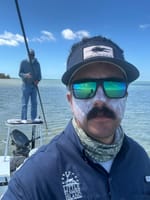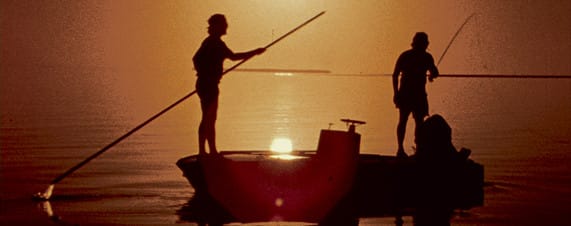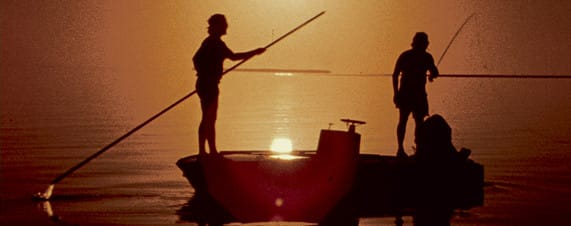
We are in a season of remembrance, it seems, for a certain breed of wild but bookish man with a history in South Florida. There’s a brand-new biography of Peter Matthiessen, the one-time CIA operative and Paris Review founder whose most beloved novels explore the frontier-era Everglades. Another examines Matthiessen’s pal, Jim Harrison, a poet and novelist most associated with Montana and Michigan, but whose Key West adventures are justly notorious.
Harrison’s fishing compadre Tom McGuane is still alive, so a biography would be incomplete. But McGuane has just released a new collection of short stories, and he’s 85 now, so he fits the elegiac moment. The Atlantic recently profiled McGuane, and staff writer Tyler Austin Harper frames the essay around a bold claim and an interesting question:
“Tom McGuane is the last of his kind,” he writes. “What will we lose when we lose the literary outdoorsman?”
It’s a provocative enough question to garner click-throughs, but to my mind unfairly dismisses a whole generation of talent—and depends on a rather narrow definition of what a literary outdoorsman could be.
McGuane’s best-known novel remains his third, Ninety-Two in the Shade, a National Book Award finalist that depicts an already-lost man further losing himself in the world of Florida charter fishing. It’s inspired by McGuane’s own trips to Key West in the 1970s, where, alongside Harrison and musician Jimmy Buffet (among other luminaries), he’d “fish for tarpon almost every day—hungover or coming off some drug or another consumed the night before,” as Harper writes. McGuane, for his good-time antics, wound up nicknamed Captain Berserko.
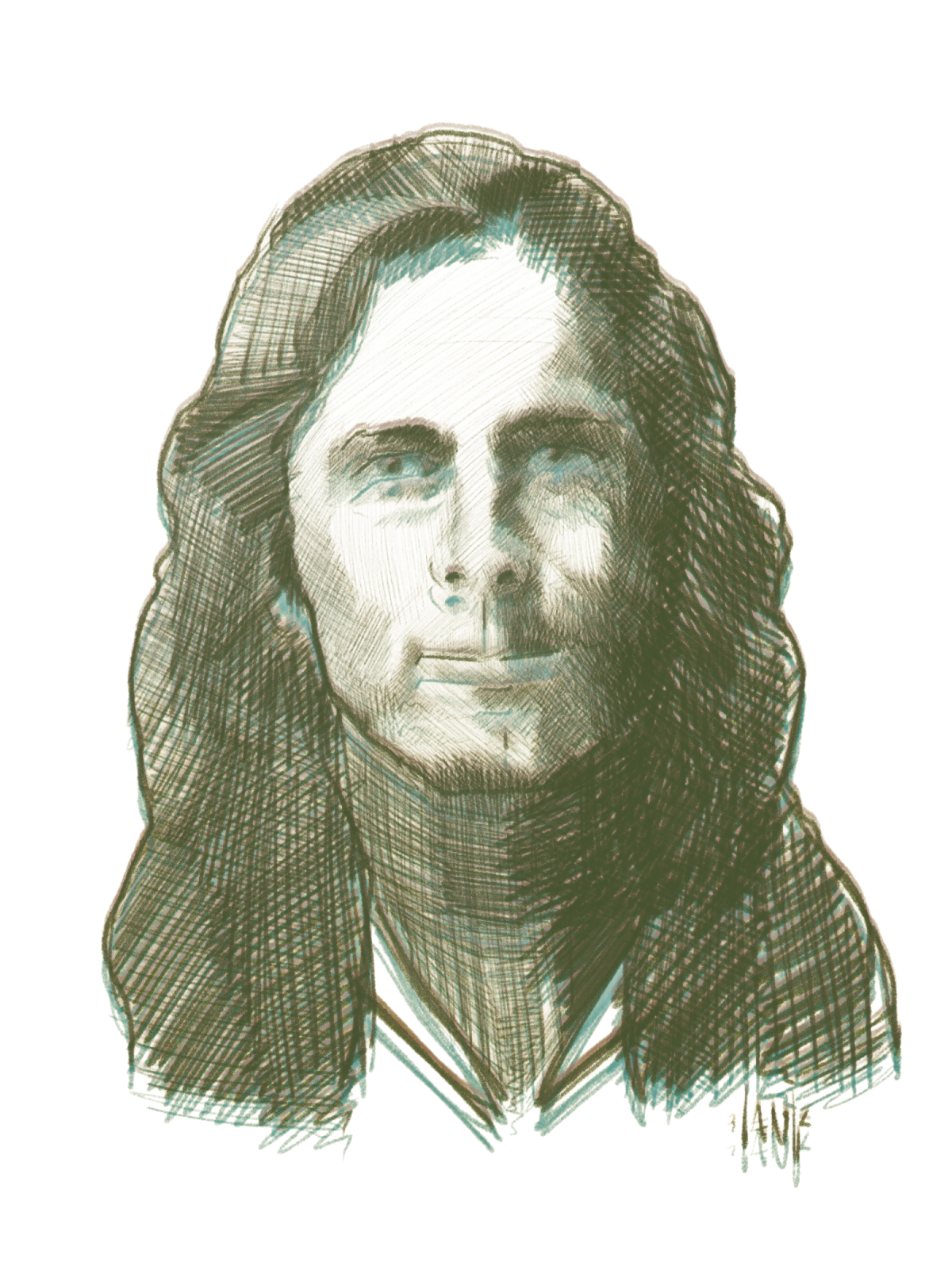
McGuane did his best to shed the moniker and lifestyle that earned it. For the most part, he has lived a quiet life ranching in Montana. Although McGuane is humble, preferring his reclusive ranch to the public eye, he is nevertheless the current president of a fly-fishing fraternity that has worshiped its author-leaders since Izaak Walton wrote The Compleat Angler in 1653: new brothers are initiated by reading his work. The nostalgia for McGuane's heyday has been growing since 2020, when Monte Burke published Lords of the Fly, which dredged McGuane, his writing friends, and their drug-infused mania for tarpon fishing back to the surface. (That book was followed in 2023 by a YETI-backed documentary called All That Is Sacred.) The eco-nostalgia machine found traction, and so the “literary outdoorsman”—and apparently his impending disappearance—has become, for the moment, an obsession of the literati.
Who is this man that’s disappearing? Harper implicitly suggests that the literary outdoorsman is a rugged fiction writer “whose work is inextricably connected to fishing, hunting, and ranching.” Expand that list just slightly, to include, say, paddling and climbing and hiking, and you don’t have to look hard to find examples. Some are best sellers! (What’s up, Peter Heller?) Steven Rinella used his MFA to launch an outdoor media empire. If he doesn’t qualify, since he has not yet written a novel, why not C.J. Box (a rancher like McGuane) or Paul Doiron? Randy Wayne White may not be a household name, but his books about a picaresque tarpon-fishing hero named Doc Ford are a big enough deal to inspire a restaurant.
Harper missed a great opportunity to acknowledge the current climate of outdoor writers and hold it up to McGuane’s legacy for comparison. Instead, he dismissed the heirs that McGuane himself mentions in the profile (Burke, David Coggins, and Chris Dombrowski specifically) as mere non-fiction writers. It's the novelists, apparently, who are going extinct.
Now, the things they write about? In Montana, trout are dying at inexplicable rates. In the Florida Keys, tarpon of trophy size have gone missing. But even McGuane, in his youth, was struggling with the loss of wilderness. (Rivers used to catch on fire, after all.) Outdoor writers from every era are prone to romanticizing the past. Isn’t it better to imagine our way to a better eco-future? Which reminds me of the existence of a whole different lineage: the literary outdoorswomen, starting with, say, Ursula K. Le Guin and Annie Proulx, writers who tend to be less isolationist and often more hopeful than McGuane, et al, and who treat the natural world as our great home rather than an arena for adventures.
It all makes me wonder about what we’re pining for as we mourn the death of the literary outdoorsman. Do we miss Field and Stream articles about bear hunting in British Columbia? They’re still being published. Do we want to drink gin on the Serengeti? Do we want to take quaaludes on a skiff in Islamorada? What’s stopping us? Maybe it’s the pioneering that makes it sexy. Tarpon? Been there, done that. But, I could be the first person to shoot a polar bear on mushrooms. I think Garden & Gun would love that, so long as I bring a bottle of Kentucky’s finest bourbon and an Ernest Hemingway costume from Kevin’s Outdoors. In fact, I’m calling Nickens right now.
Even to insist that hunting and fishing must dominate the literary outdoorsman’s life is silly. Hemingway—whom Harper holds up as archetypal of this category—wrote about far more than these two sports. Yes, for many of the canonical outdoorsmen-writers—and even for their characters—these sports were obsessions, but none of them thought that being obsessed was a pre-requisite for a good life. In fact, Ninety-Two in the Shade was a warning against the dangerous obsession of permit fishing. Fishing for McGuane and his contemporaries was escapism. Maybe we still need escapist writers, but to bow our heads for the passing of so-called rugged individualists who left their wives for months at a time to go fishing is ridiculous.
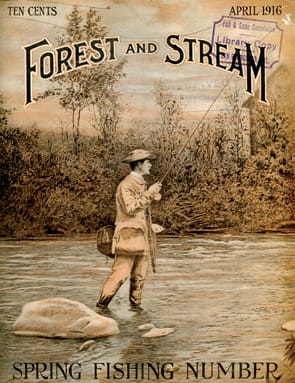
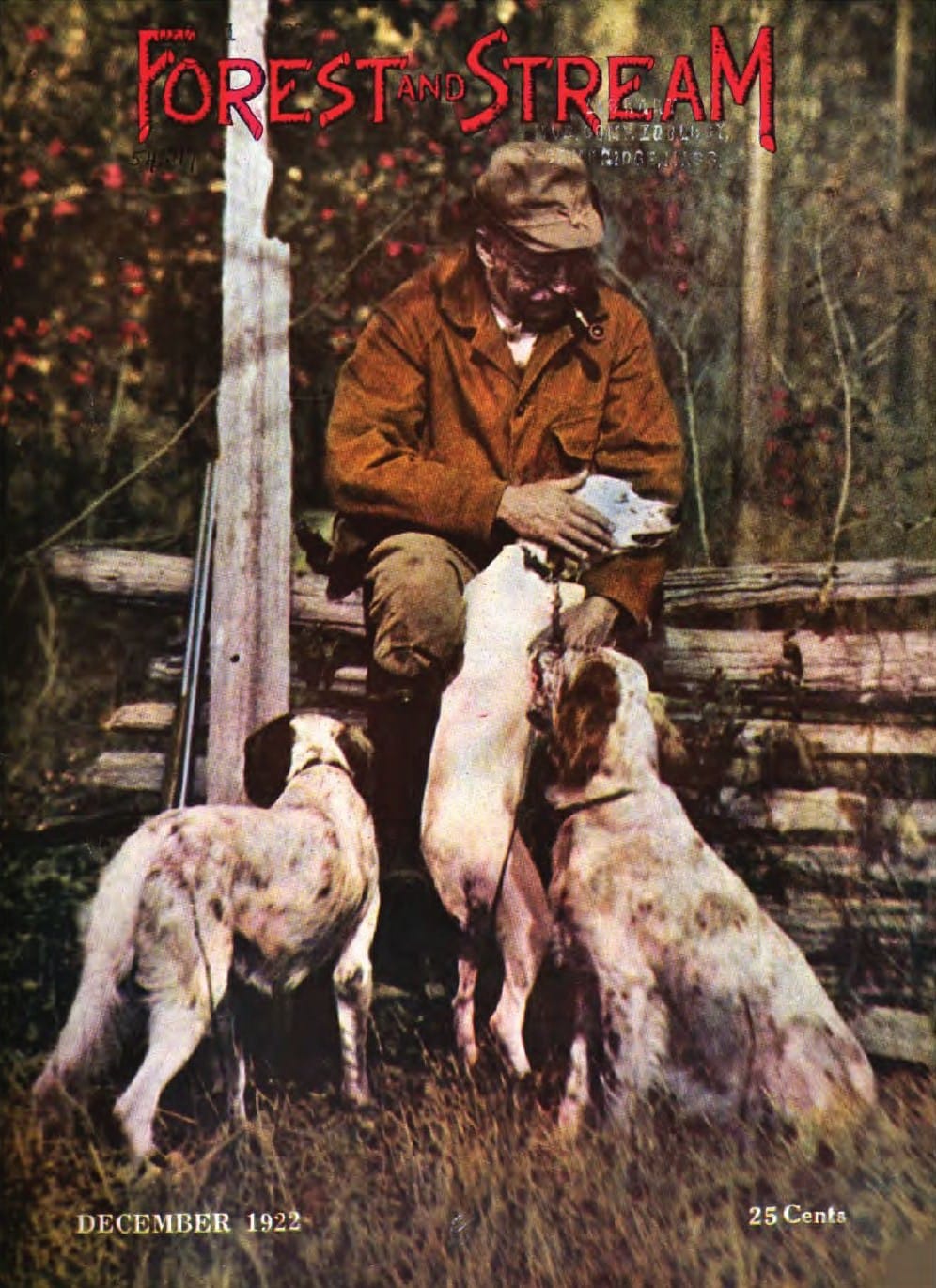
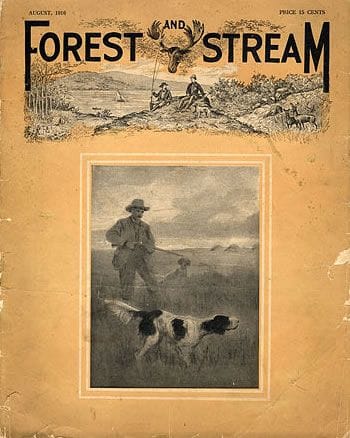
Forest and Stream—which later merged with Field & Stream—was first published in the 1870s. The magazine was part of a new romanticization of the sportsman that coincided with concerns over the rapid disappearance of a "frontier."
McGuane is a fine writer—and Harper wrote a fine profile—but if he’s the last of a kind, that fact has nothing to do with good writing, or being free, or being outside. What made McGuane part of a “kind” was his friendship with similar writers who danced around the same campfires. Those fires are still burning, even—perhaps especially—in the South, where northerners like McGuane once came to exploit relatively untouched sporting resources after exhausting their own. Florida in '70s was like Eden for fishermen. Nowadays, as Monte Burke will tell you, it’s not the same, and the fire dancers are not blameless. But there’s plenty of wilderness we still have left to lose, and plenty of gonzo fishing literature to be read.
Now, if to qualify as a literary outdoorsman, you need to be featured on the cover of GQ with leather snake boots and an Italian shotgun, then we might have a problem. Writers just don’t get that famous these days. Perhaps what Harper means to mourn is the era when novelists mattered, whether they wrote about sports or not. But it feels like he is mourning, too, a patrician ideal of the sporting gentleman—or at least the privileged bohemian like McGuane—which, maybe, good riddance. Harper suggests that part of the fading-away is the fact that “far more Americans inhabit urban and suburban terrain than when [McGuane] began writing fiction half a century ago.” But again, what’s really fading away? The audience, the writer? The outdoors itself? They may be all tied together, but that just means we need new stories.
My shelves are filled with the work from newer, young literary outdoorsmen—many of them Southern, where there’s always been a different relationship with nature. Sure, we have quail plantations, but most of the folks I know who write about hunting and fishing down here feature characters who are killing deer out of season to feed their family or running trot lines. There are no paeans to the particular way that a pheasant drops when you fill its breast with shot. Taylor Brown, Silas House, and David Joy might be just as good as McGuane—give them time to earn their accolades. In the meantime, let's think about what we want from the next generation of outdoor writing, and what parts of the old myth needed to die anyway.
Hank Hershey is a writer, illustrator, and artist. He's also a PhD scientist with expertise in river restoration and fisheries ecology. His work has been in scientific journals, Emmy-nominated documentaries, and his own magazine: Southern Culture on the Fly.

